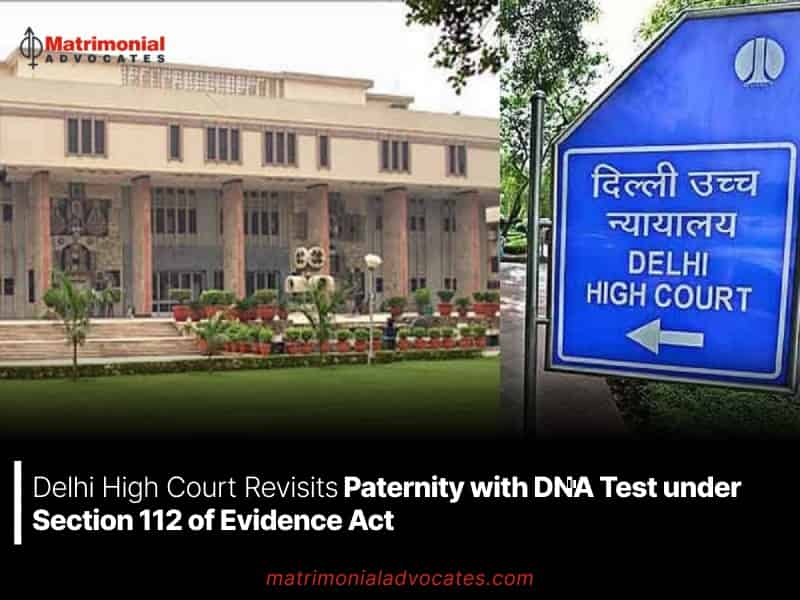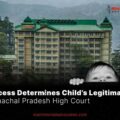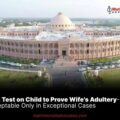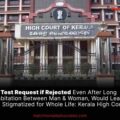
Section 112 of the Evidence Act underscores the principle that children born within the confines of a legally recognized marriage are deemed legitimate per se and it ensures that no unwarranted assumptions of impropriety or moral transgressions are made and instead places the burden of proof on those who contest the child’s legitimacy.
In the Delhi High Court, a petition was filed pursuant to Section 482 of the Criminal Procedure Code, seeking the quashing of a judgment dated 20-03-2019 rendered by the District and Sessions Judge of the South-East District, Saket, Delhi, in connection with a criminal appeal. The judgment in question upheld the ruling issued by the Metropolitan Magistrate of Saket, Delhi, with regard to a child’s maintenance claim. The child’s birth occurred during the petitioner’s subsisting marriage with the first respondent. In deliberating upon the matter, the Honorable Justice Swarana Kanta Sharma, in upholding the impugned order, relied on the DNA test report, which conclusively demonstrated that the first respondent was not the biological father of the child.
The petitioner, formerly engaged as a domestic help at the respondents’ residence for a duration of three years, spanning from February 2013 to February 2016, asserted that during this tenure, the first respondent had allegedly compelled her into non-consensual sexual relations by making false promises of marriage. Furthermore, the petitioner alleged that she was coerced into engaging in sexual acts with two of the first respondent’s acquaintances after initially refusing such demands, citing threats of marriage as the coercion.
Subsequently, on 02-03-2016, the petitioner and the first respondent entered into wedlock, and notably, on 01-04-2016, a child was born to the petitioner, a period of less than one month following their marriage. On 14-07-2016, the petitioner initiated legal proceedings under Section 12 of the Protection of Women from Domestic Violence Act, 2005 (DV Act) against the respondents, accompanied by an income affidavit and a request for interim maintenance. In response, on 19-01-2017, the respondents submitted their reply to the petition, concurrently seeking a DNA test to establish the child’s parentage, which was subsequently granted. However, the Magistrate denied the maintenance claim, attributing the denial to the petitioner’s alleged concealment of income. Subsequently, an appeal was filed with the Sessions Court, challenging this decision. As a result, the petitioner sought the quashing of the orders issued by the Magistrate and the Sessions Court, dated 01-12-2017 and 20-03-2019, respectively.
Regarding the application of the presumption under Section 112 of the Indian Evidence Act, the petitioner argued that it should be applied to a child born within the confines of a valid marriage. The court observed that Section 112 of the Evidence Act primarily required the establishment of a valid marriage between the child’s mother and another individual to conclusively prove the child’s legitimacy concerning the mother’s spouse. Notably, Section 112 of the Evidence Act allows for a limited exception to this presumption, particularly in cases involving non-access. Thus, the singular permissible route to challenge the otherwise unassailable presumption under Section 112 is through the demonstration of non-access.
With regard to the utilization of a DNA test to challenge the presumption under Section 112 of the Evidence Act, the court emphasized that the burden of demonstrating non-access rested on the party asserting it. The evidence provided needed to be substantial, unequivocal, compelling, and definitive, surpassing the threshold of a mere preponderance of probabilities. It was explicitly noted that a reasonable but inadequate explanation would not suffice; instead, the evidence needed to meet the stringent standard of being “proved,” as outlined in Section 3 of the Act.
The court duly acknowledged that the DNA test had been conducted as per judicial order and had not been contested. The DNA test report conclusively established that the first respondent was not the biological father of the petitioner’s child. Consequently, the protection offered under Section 112 of the Evidence Act would have been applicable only if the DNA test had not been conducted. The court underscored the legislative intent behind the enactment of Section 112 of the Evidence Act, which was to shield every child from being labeled “illegitimate” and to extend the protective veil of legitimacy by invoking the presumption under Section 112 in favor of a child’s legitimacy when born during the subsistence of a valid marriage.
The court, based on the DNA test results, concluded that the first respondent was not the biological father of the petitioner’s child, leading to the denial of child maintenance. However, since the existence of the marriage between the parties was not in dispute (although its legality was contested and subject to adjudication in the relevant court of law), the court determined that the trial court had erred in denying maintenance to the petitioner at that stage. As a result, the case was remanded for a fresh assessment of the maintenance amount to be awarded to the petitioner.





